US secretary of state Antony Blinken has urged Israel to ensure more humanitarian aid and do more to protect Palestinian civilians in Gaza or else there will be “no partners for peace”.
Israel warned that it was on high alert for attacks on its border with Lebanon as fears grew that the conflict could widen.
Israeli troops tightened their encirclement of Gaza City, the focus of their campaign to crush the enclave’s ruling Hamas militants, who launched a brutal attack on Israeli communities that started the war.
But ever since that assault on October 7, there have been concerns the conflict could ignite fighting on other fronts, and Israel and the Iranian-backed militant group Hezbollah have repeatedly traded fire along the Lebanon border.
“We will not be limited to this,” he said, suggesting escalation was possible. Still, Nasrallah stopped short of announcing that Hezbollah is fully engaging in the war.
Mr Blinken, on his third trip to Israel since the war began, reiterated US support for Israel in the war, saying it has the right to defend itself. But he said a “humanitarian pause” was needed to boost aid deliveries to Palestinian civilians amid growing alarm over the humanitarian crisis in Gaza.
After meeting Mr Blinken, Israeli Prime Minister Benjamin Netanyahu said Israel “refuses a temporary ceasefire that doesn’t include a return of our hostages”, referring to some 240 people Hamas abducted during its attack. He said Israel was pressing ahead with its military offensive with “all of its power”.
Mr Blinken said there had to be a substantial and immediate increase in humanitarian aid to Gaza, where “we need to do more to protect Palestinian civilians”.
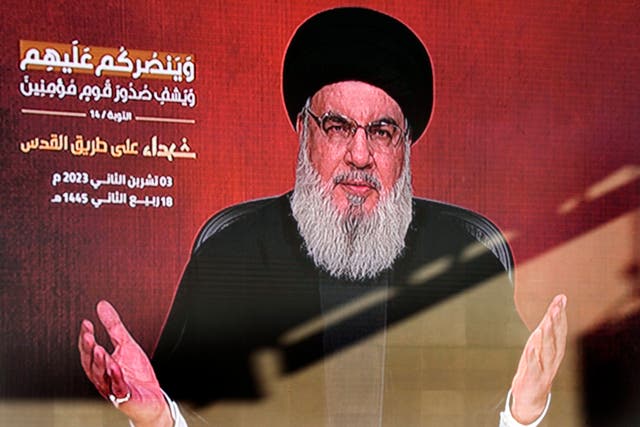
Hezbollah, an ally of Hamas, attacked Israeli military positions in northern Israel with drones, mortar fire and suicide drones on Thursday. The Israeli military said it retaliated with warplanes and helicopter gunships, and spokesman Rear Admiral Daniel Hagari said civilians were wounded in the Hezbollah attacks.
“We are in a high state of readiness in the north, in a very high state of alert, to respond to any event today and in coming days,” he said.
Mr Blinken said the US, which has deployed aircraft carriers and other forces in the eastern Mediterranean, was committed to ensuring that no “second or third front” opens in the conflict, referring to Hezbollah.
In his speech, Nasrallah said his militia is not deterred by U. warnings, saying: “Your fleets in the Mediterranean… will not scare us.”
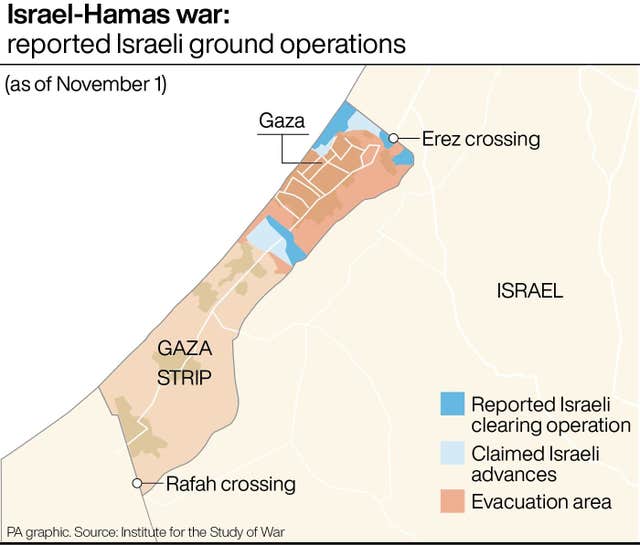
Israel has promised to unleash vast destruction in Lebanon if all-out war erupts, accusing Hezbollah of hiding its military installation in the midst of residential areas.
The two enemies fought an inconclusive war in 2006. Renewed fighting could also risk drawing Iran, which backs both Hamas and Hezbollah, into the conflict.
More than 9,200 Palestinians have been killed in Gaza so far, mostly women and children, and more and than 23,000 people have been wounded, the Gaza Health Ministry said, without providing a breakdown between civilians and fighters.
More than 1,400 people have died on the Israeli side, mainly civilians killed during Hamas’s initial attack, when some 240 people were also taken hostage. Some 5,400 have also been injured.
Twenty-four Israeli soldiers have been killed in Gaza since the start of the ground operation. Since the start of the war, seven Israeli soldiers and a civilian have been killed in different incidents along Israel’s border with Lebanon.
“We stand strongly for the proposition that Israel has not only the right but the obligation to defend itself, and to make sure that October 7 should never happen again,” Mr Blinken said.
“How Israel does this matters and it is very important that when it comes to the protection of civilians who are caught in the crossfire of Hamas’s making that everything be done to protect them and to bring assistance to those who so desperately need it.”
This is Mr Blinken’s third trip to Israel since the war began and he also plans to visit Amman, Jordan.
It follows President Joe Biden’s suggestion for a humanitarian “pause” in the fighting. The aim would be to let in aid for Palestinians and let out more Palestinians who hold foreign passports and wounded.
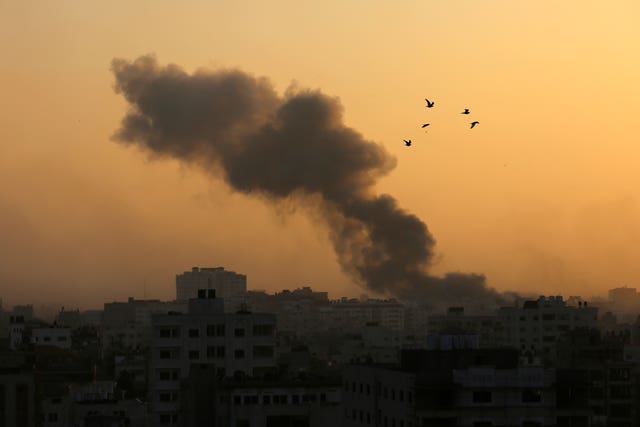
Mr Blinken first held talks with Israeli Prime Minister Benjamin Netanyahu behind closed doors before starting wider discussions with the leader and his war cabinet and than meeting President Isaac Herzog.
More than 3,700 Palestinian children have been killed in 25 days of fighting, according to the Health Ministry in Hamas-run Gaza.
Bombardment has driven more than half the territory’s 2.3 million people from their homes. Food, water and fuel are running low under Israel’s siege, and overwhelmed hospitals warn they are on the verge of collapse.
Israel has allowed more than 260 trucks carrying food and medicine into Gaza, but aid workers say it is not nearly enough. Israeli authorities have refused to allow fuel in, saying Hamas is hoarding fuel for military use and would steal new supplies.
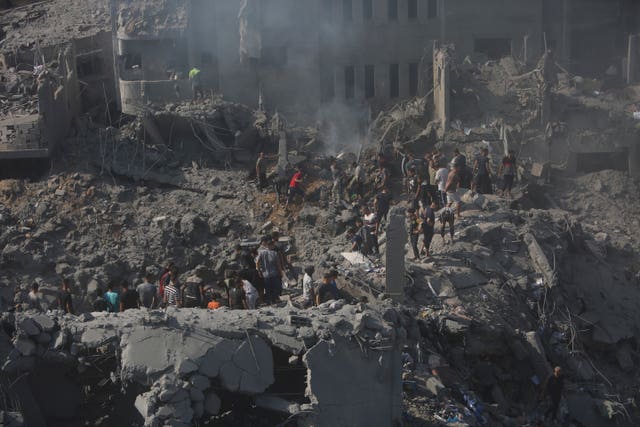
Israel and the US seem to have no clear plan for what would come next if Hamas rule in Gaza is brought down – a key question on Mr Blinken’s agenda during the visit, according to the State Department.
Meanwhile, military officials said Israeli forces have now completely encircled Gaza City, a densely packed cluster of neighbourhoods that Israel says is the centre of Hamas military infrastructure and includes a vast network of underground tunnels, bunkers and command centres.
Israeli forces are “fighting in a built-up, dense, complex area”, said the military’s chief of staff, Herzi Halevy.
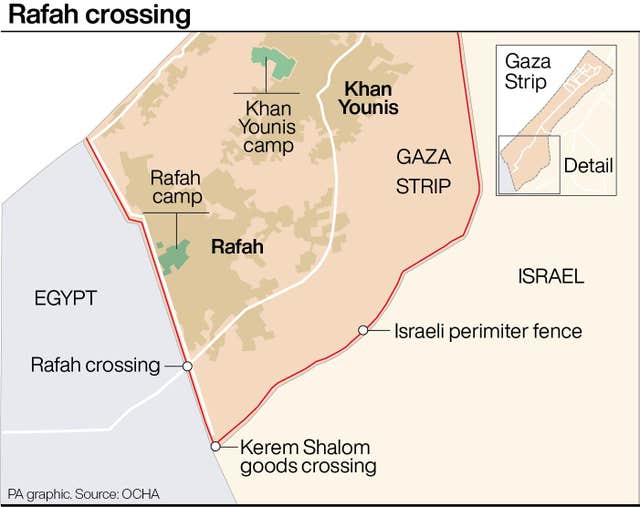
Hamas’s military wing said early Friday that its fighters battled Israeli troops in several areas in Gaza and claimed they killed four soldiers on the northern edge of the city of Beit Lahiya. It also claimed to have destroyed several tanks with locally made anti-tank rockets.
Neither the reports from Israel nor Hamas could be independently verified.
Casualties on both sides were expected to rise as Israeli troops advance towards the dense residential neighbourhoods of Gaza City. Israel has warned residents to immediately evacuate the Shati refugee camp, which borders Gaza City’s centre.
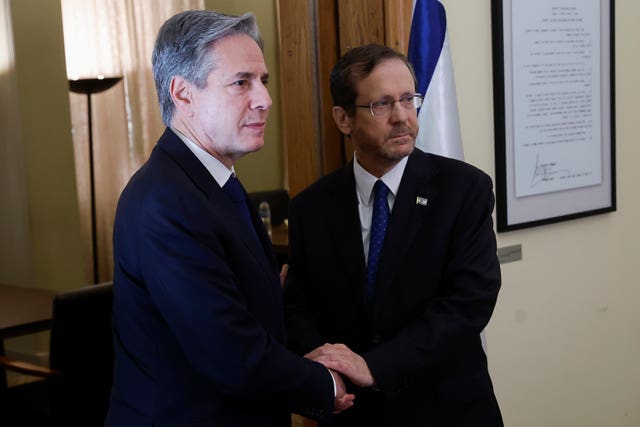
Still, four UN schools-turned-shelters in northern Gaza and Bureij were hit in recent days, killing 24 people, according to Philippe Lazzarini, general-secretary of the UN agency for Palestinian refugees, known as the UNRWA.
In the occupied West Bank overnight, Israeli forces killed seven Palestinians in different places and arrested many more, according to the Israeli military and Palestinian health officials.






